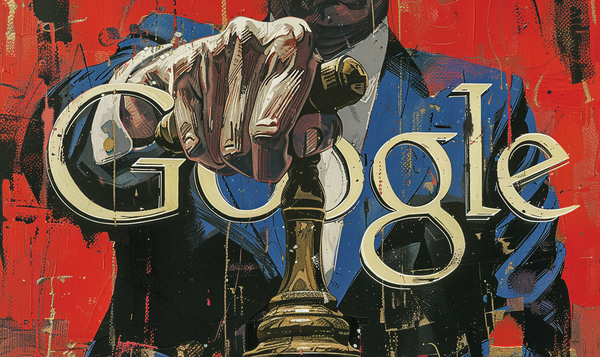Once upon a time in the vast digital kingdom, there was a giant named Google. This behemoth’s reach extended to every corner of the internet, amassing wealth and power like a dragon hoarding gold. But this isn't a fairy tale. It’s the gripping saga of how the seemingly invincible Google found itself at the receiving end of a landmark antitrust ruling.
Judge Amit Mehta’s decree that
Google has monopolized the search market could rewrite the rulebook for Big Tech, and the plot thickens with every new development.
A Blow to the Titan
The US Department of Justice’s victory against Google isn’t just another courtroom drama; it’s a seismic event. Judge Mehta, wielding the gavel like Thor’s hammer, declared Google guilty of monopolistic behavior. The implications are staggering. This ruling doesn’t just affect Google’s operations; it
threatens to dismantle the very foundations of its empire. While the court did not find Google guilty of monopolizing search advertising or destroying evidence related to this monopoly, it’s a significant strike against its dominance in the search engine market.
Kent Walker, Google’s president of global affairs, put on a brave face, spinning the narrative that Google simply offers the best search engine and that the ruling is a slap on the wrist for making it too
easily accessible. But beneath the corporate rhetoric, the tech titan is gearing up for a battle royale in the appellate courts. Google isn’t retreating; it’s reloading.
Collateral Damage: Mozilla and Apple in the Crossfire
The ruling’s reverberations are being felt far beyond Google’s Mountain View headquarters. Mozilla, the noble nonprofit behind the Firefox browser, finds itself in dire straits. A staggering 80% of Mozilla’s revenue stems from Google’s
coffers, specifically $510 million in 2021-2022 alone. This financial lifeline comes from Google paying Mozilla to keep its search engine as Firefox’s default. Should Google be barred from these payments, Mozilla could be staring down the barrel of an existential crisis.
Apple, the Cupertino colossus, might not be facing an existential threat, but it’s certainly looking at a significant financial hiccup. Google reportedly pays Apple around $18 billion to remain the
default search engine on Safari across iPhones, iPads, and Macs. This arrangement is a significant, albeit not critical, revenue stream for Apple. However, the tech giant is already laying the groundwork for a Google-free future, focusing on AI integrations like Siri enhancements and partnerships with OpenAI’s ChatGPT. Apple’s strategic pivot aims to reduce its reliance on Google, potentially forging new alliances with various AI providers.
The Shifting Sands of Search Engines
The antitrust ruling could be a harbinger of change for the entire search engine market. AI-based search engines like Perplexity and Chat-GPT are emerging as formidable contenders, appealing to early adopters and tech-savvy users alike. Julian Simon Award–winner Balaji Srinivasan recently demonstrated how to switch from Google to Perplexity AI in under 30 seconds, and such shifts could become the norm.
The way people interact with the
internet is evolving. Mobile devices, with their myriad of apps, are supplanting web browsers as the primary mode of interaction. This trend diminishes the significance of default search engines, as users increasingly rely on app-based searches. The potential of large language models (LLMs) to supplant traditional search engines is real, provided they can overcome their penchant for “hallucinating” facts.
Legal Labyrinth and Economic Impact
Silicon Valley’s
legal minds are undoubtedly burning the midnight oil, dissecting Judge Mehta’s lengthy opinion. Describing default search placements as “extremely valuable real estate,” Mehta highlighted the strategic importance of these positions. If Google is forbidden from securing these placements through payments, tech companies like Apple and Samsung could lose substantial ad-sharing revenues, disrupting their financial ecosystems.
Analysts predict that the judge might
mandate proactive user prompts to choose their search engines rather than pre-setting a default. Such a remedy could significantly impact Apple, potentially leading to a 15% earnings headwind if Google’s payments vanish. This ruling, expected late this year or early 2025, will certainly be appealed, extending the legal drama.
Google’s Other Legal Battles
This ruling is but one front in Google’s multi-faceted legal war. The search titan is entangled in a web
of antitrust cases that challenge its dominance across various domains:
Digital Advertising Technologies (2023)
In January 2023, the U.S. Department of Justice, alongside eight states, filed a civil antitrust lawsuit against Google for monopolizing key digital advertising technologies. The complaint alleges that Google engaged in anti-competitive conduct over 15 years, acquiring competitors, forcing the adoption of its tools, and manipulating auction
processes to maintain its dominance. This case seeks to restore competition in the ad tech sector and obtain equitable and monetary relief.
State of Texas v. Google (2020)
In 2020, a coalition of states led by Texas filed an antitrust lawsuit against Google, focusing on its ad tech practices. This lawsuit accuses Google of unlawfully abusing its dominance in digital advertising to harm competitors and manipulate ad auctions. The case underscores Google's
alleged use of its market power to coerce publishers and advertisers into using its ad tech products, stifling competition.
Multiple State-Led Lawsuits
Various states have initiated their own lawsuits against Google, addressing different aspects of its business practices. These include lawsuits from Colorado, Nebraska, and other states, which focus on Google’s search dominance and broader anti-competitive behaviors in the digital advertising
space.
European Union and United Kingdom Investigations
Google’s digital advertising practices are also under scrutiny outside the United States. Both the European Union and the United Kingdom have launched investigations into Google's ad tech practices, examining whether the company has abused its market position to the detriment of competitors and consumers.
The Broader Impact on Digital Advertising
This ruling is
but a skirmish in the broader war on Google’s digital advertising practices. From Texas-led coalitions targeting Google’s ad tech dominance to European investigations, Google’s legal headaches are multiplying like rabbits on fertility drugs. The digital advertising ecosystem is watching with bated breath, as these cases aim to dismantle Google's alleged stronghold, ensuring a fairer marketplace.
The Conclusion: A Digital Drama Unfolding
As Google navigates
this labyrinthine legal landscape, one thing is certain: the digital advertising world is in for a shake-up. Whether it leads to a fairer, more competitive market or simply shifts the power dynamics remains to be seen. What’s clear is that the ripple effects of this ruling will be felt far and wide, from the boardrooms of Silicon Valley to the browsers of everyday users.
Google’s future, post-antitrust decision, is a tale of intrigue, high stakes, and potential
reinvention. It’s not just a story of a tech giant’s trial but a chapter in the ever-evolving narrative of the digital age. So grab your popcorn; this show is far from over.















